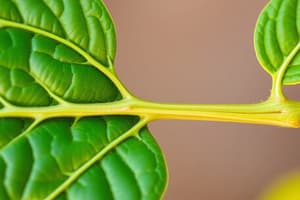Podcast
Questions and Answers
What are the three levels of transport in plants?
What are the three levels of transport in plants?
- Whole plant transport (correct)
- Atmospheric transport
- Lateral transport (correct)
- At cellular level (correct)
What is the effect of adding solutes on water potential?
What is the effect of adding solutes on water potential?
Lowers water potential
Water moves from low water potential to high water potential.
Water moves from low water potential to high water potential.
False (B)
What is transpiration?
What is transpiration?
Define water potential in plants.
Define water potential in plants.
What theory explains the movement of water from roots to leaves?
What theory explains the movement of water from roots to leaves?
What role does sunlight play in water movement in plants?
What role does sunlight play in water movement in plants?
Water moves from ______ to ______ in plants.
Water moves from ______ to ______ in plants.
What is one pathway through which water and minerals move into roots?
What is one pathway through which water and minerals move into roots?
What does the Casparian strip do?
What does the Casparian strip do?
Flashcards are hidden until you start studying
Study Notes
Plant Transport
- Three levels of transport in plants:
- Short-distance: movement of water and solutes within cells or between cells and their immediate surroundings.
- Long-distance: movement of water and solutes through the xylem and phloem over long distances.
- Cellular: substances move in and out of cells, including uptake and compartmentalization.
Water Potential
- Solutes and water potential: Adding solutes lowers water potential, making the solution more negative.
- Water movement: Water moves from areas of high water potential to areas of low water potential.
Transpiration
- Transpiration: The loss of water vapor from plant leaves through stomata.
Water Potential in Plants
- Definition: Water potential is the potential energy of water in a plant. It is a measure of the relative tendency of water to move from one area to another.
Cohesion-Tension Theory
- Explains water movement from roots to leaves: Water is pulled upward through the xylem by the combination of cohesion (water molecules sticking to each other) and tension (negative pressure created by transpiration from leaves).
Sunlight and Water Movement
- Sunlight's role: Sunlight provides energy for photosynthesis in leaves, driving transpiration and creating a negative pressure that pulls water upward.
Water Movement Direction
- Water moves from roots to leaves
Apoplast Pathway
- Pathway for water and mineral movement into roots: The apoplast pathway is the continuum of cell walls and intercellular spaces.
Casparian Strip
- Function: The Casparian strip is a waterproof barrier in the endodermis of roots that prevents water and minerals from entering the vascular tissue via the apoplast pathway, forcing them to pass through the selective plasma membranes of endodermal cells.
Studying That Suits You
Use AI to generate personalized quizzes and flashcards to suit your learning preferences.




